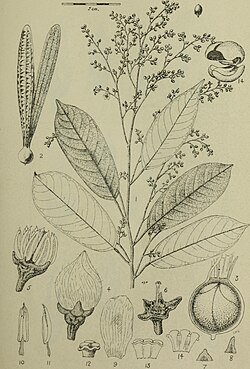Biology:Anisoptera laevis
| Anisoptera laevis | |
|---|---|

| |
| Botanical drawing, 1913 | |
| Scientific classification | |
| Kingdom: | Plantae |
| Clade: | Tracheophytes |
| Clade: | Angiosperms |
| Clade: | Eudicots |
| Clade: | Rosids |
| Order: | Malvales |
| Family: | Dipterocarpaceae |
| Genus: | Anisoptera |
| Species: | A. laevis
|
| Binomial name | |
| Anisoptera laevis Ridl.[2]
| |
Anisoptera laevis is a tree in the family Dipterocarpaceae. The specific epithet laevis means "smooth", referring to the leaves.[3]
Description
Anisoptera laevis grows as an emergent tree up to 65 metres (210 ft) tall, with a trunk diameter of up to 2 m (7 ft). It has buttresses up to 15 m (50 ft) tall and up to 4 m (13 ft) wide. The bark is fissured and flaky. The leaves are oblong to obovate and measure up to 11 cm (4 in) long. The inflorescences measure up to 12 cm (5 in) long and bear yellow flowers.[3]
Distribution and habitat
Anisoptera laevis is native to Thailand, Peninsular Malaysia, Singapore, Sumatra and Borneo. Its habitat is dipterocarp and hill forests, at altitudes of 150–900 m (500–3,000 ft).[1]
Conservation
Anisoptera laevis has been assessed as vulnerable on the IUCN Red List. It is threatened by land conversion for agriculture and by logging for its timber (now illegal). The species is found in protected areas throughout its distribution.[1]
References
- ↑ 1.0 1.1 1.2 Nguyen, H.N.; Nanthavong, K.; Luu, H.T.; Hoang, V.S.; Barstow, M.; Khou, E.; Ly, V.; Newman, M.F. et al. (2017). "Anisoptera laevis". IUCN Red List of Threatened Species 2017: e.T33065A2832042. doi:10.2305/IUCN.UK.2017-3.RLTS.T33065A2832042.en. https://www.iucnredlist.org/species/33065/2832042. Retrieved 15 November 2021.
- ↑ "Anisoptera laevis". Royal Botanic Gardens, Kew. http://powo.science.kew.org/taxon/urn:lsid:ipni.org:names:320555-1. Retrieved 8 September 2021.
- ↑ 3.0 3.1 Ashton, P. S. (2004). "Anisoptera Korth.". in Soepadmo, E.; Saw, L. G.; Chung, R. C. K.. Tree Flora of Sabah and Sarawak. 5. Forest Research Institute Malaysia. pp. 75. ISBN 983-2181-59-3.
Wikidata ☰ Q2850149 entry
 |


